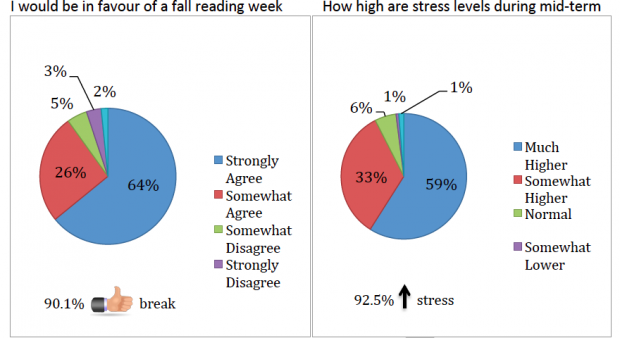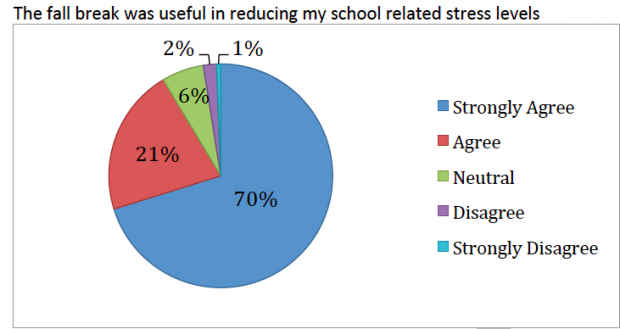Meagan Willman, a second-year student taking the child and youth care program, has benefited from the week off in October. She caught up on schoolwork, spent a whole day in her pajamas and ate popcorn and snacks while watching shows and movies all week long.

“I think that everybody needs a break sometimes,” said Willman. “I know last year my hardest time of the year was right around midterms, and it would have been nice to be able to have a week off to sit down, study (and) catch up on everything.”
Although it was late to the party, Algonquin College joined colleges and universities around the province last week giving its students a fall break week.
The first fall break in the history of Algonquin has allowed many programs – excluding 29 chosen programs – to take a break from classes.
This is because the college has now implemented the 14-week model: seven weeks of school, one week break in the middle, then another seven weeks for the rest of the semester.
The 29 programs that didn’t have this break were requested by the programs themselves. If they wished to seek this exemption, they had to request it through Claude Brulé, the senior vice president academic at the time, now the president.
Emilie Laundriault, a first-year hairstyling student, enjoyed the break and felt for those students who didn’t receive it. “I was able to catch up on a lot of work,” said Laundriault. “I can’t imagine not having it.”
Other colleges across the province had already started the fall reading week, such as Durham College, Niagara College, Sheridan College and many more.
A study and survey conducted by a team at Brock University showed the effects of having a reading week in the fall as opposed to not having it using Brock University students.

The survey included 713 student participants, of those 267 being male and 446 being female.
Many of the students preferred having the fall reading week and over 50 per cent of them agreed that stress level during the mid-term season was very high.
They used data from the previous year without the break, 2012-2013, and compared it to that of the data used with the break from 2013-15.
The majority of students agreed that it reduced stress in their lives and had a positive impact on their mental health.
So why was Algonquin late to the party?
“Starting September 2019, the College moved to the 14-week teaching term from the current 15-week model,” said Brulé in an email. “Algonquin College saw this as an opportunity to highlight its adaptability and its concern for students’ well-being. The change is a positive move for our students that will support improved student mental health and promote long-term academic success.”
The study by Brock had an effect on the college as well, further pushing the school to implement the 14-week model.

“Many large colleges in Ontario have been using the 14-week model for years so we knew it could be successful – and our students have been saying they would benefit from the change,” said Brulé. “We know that the mid-term break will help students in several ways, such as having a break from their studies to recharge.”
Weeks nine and ten in the first semester are typically seen as the weeks where most students tend to drop out according to Brulé.
With the break essentially in the eighth week, the college hopes to see that number go down as students have a chance to catch their breath and refocus.
SA president Deijanelle Simon sees the break as only a benefit for students.
“The main focus when the SA presented having a reading week in the first semester was for student’s mental health,” said Simon. “In most cases, post-secondary schools do have one in each semester and so we really wanted to push for that. I’m very excited that it’s rolling out.”
Simon knew many students were speaking up to get the break in the fall and is happy that she is able to see it come to light while still enrolled.
“Students were talking about it way before,” she said. “The SA presented it to college administration. We talked about the implications of what it might look like.”
One issue that students seem to have taken notice of is the lack of Monday classes. Holidays such as Thanksgiving and other Monday holidays have only allowed for 12 of the possible 14 classes.
“Monday classes are something that we’ve heard from students,” said Simon. “It’s something that we’re talking about with college administration in terms of how we can offset that.”
Simon mentioned that at uOttawa they switch the last class before winter exams from Monday to Wednesday to combat the class being missed so many times during the year. It’s something the college may be looking into.


